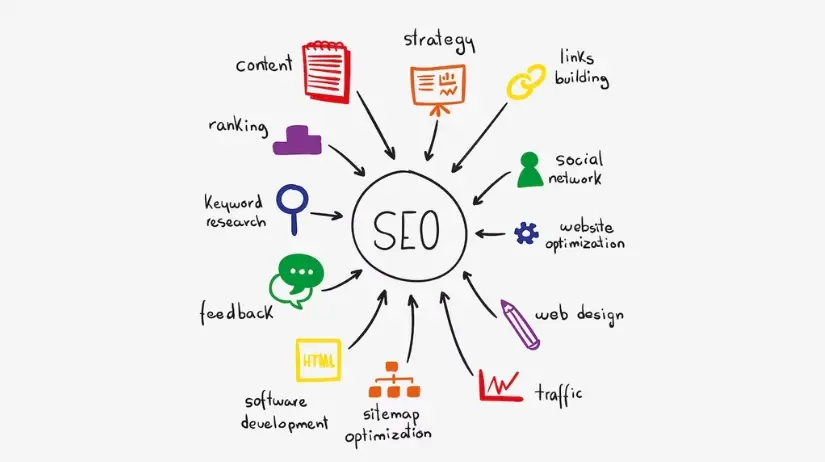Maximising the Potential of Your Title Tags with Strategic Keyword Use
Title tags are an important on-page element of search engine optimisation (SEO) as they provide a brief and concise description of the content to search engines and users. By strategically using keywords in your title tags, you can maximise their potential to enhance your website’s search engine rankings and increase traffic. Here are some tips for using keywords in your title tags:
-
Use relevant and specific keywords: Choose keywords that accurately describe the content of your website page. Be clear and avoid generic terms that are too broad.
-
Place keywords at the beginning of your title tag: Search engines give more weight to keywords that appear at the beginning, so try to include your most important keywords at the start.
-
Keeping your title tag under 60 characters: Google displays the first 60-70 characters of a title tag, so make sure your title tag is concise and to the point.
-
Avoid keyword stuffing: Using keywords in your title tag is essential. Avoid stuffing them in at the expense of readability. Use them naturally and only where they fit naturally.
-
Make your title tag unique: A unique title tag for the pages on your website is a must-have that reflects the content of that page. Avoid duplicating title tags across multiple pages.
You can create title tags optimised for search engines and users alike, helping you focus on website traffic and enhance the overall search engine rankings. Follow these tips for maximum benefits.
Use relevant and specific keywords:
Using relevant and specific keywords is crucial for optimising your title tags and improving your website’s search engine rankings. When selecting keywords to include in your title tag, it’s essential to consider the intent of your target audience and the specific topics or themes covered on your web page.
To ensure that your keywords are relevant and specific, start by conducting keyword research to identify popular search terms related to your content. Google Keyword Planner is used to locate keywords with search volumes that are high and low competition.
Once you have identified relevant keywords, choose the most specific and accurate terms that best describe the content of your web page. Avoid using generic or broad keywords that may be too general to attract targeted traffic. Instead, focus on long-tail keywords that are more content-specific.
When incorporating keywords into your title tag, ensure that they are placed at the beginning of the tag and flow naturally within the sentence. Avoid keyword stuffing, which involves using the same keyword multiple times in the title tag.
Using relevant and specific keywords in your title tags can increase your website’s visibility and attract more targeted traffic, resulting in higher engagement and conversion rates.
Placing keywords at the beginning of your title tag:
Placing keywords at the beginning of your title tag is an effective way to optimise your website’s title tags for search engine visibility. Search engines give more weight to the keywords that appear at the beginning of the title tag, as they are considered more important than those that appear later in the tag.
When creating your title tag, it’s essential to include the most relevant and specific keywords at the beginning of the tag. Not only does this help the search engines understand the published content, but it also helps users quickly identify whether your page is relevant to their search query.
For example, if you’re creating a title tag for a blog post about healthy meal prep, a reasonable title tag might be “Healthy Meal Prep: 10 Quick and Easy Recipes for Busy Weeknights”. In this example, the keywords “healthy meal prep” appear at the beginning of the title tag, followed by a description of the blog post’s content.
When placing keywords in your title tag, be sure to use them in a way that reads naturally and provides context for the user. Avoid keyword stuffing, which means including too many keywords in your title tag to manipulate search engine rankings. This can harm your website’s overall search engine visibility.
Placing relevant and specific keywords at the beginning of your title improves your online visibility and boosts your personal or business SEO.
Keep your title tag under 60 characters:
Keeping your title tag under 60 characters is critical to optimising your website’s title tags for search engine visibility. While there is no exact character limit for title tags, search engines like Google typically display the initial 60-70 characters of a title tag in search results.
Keeping your title tag under 60 characters ensures the entire tag is visible in search results. Additionally, a concise and focused title tag can help improve your website’s click-through rate.
When creating your title tag, consider using a clear headline that accurately reflects the content of your web page. Include the most relevant and specific keywords at the beginning of the tag, and avoid unnecessary words that do not add value to the user.
For example, instead of using a long and vague title tag like “Welcome to our Website. A Comprehensive Guide to Our Products and Services”, consider using a more focused and concise title tag like “High-Quality Office Supplies | Buy Online Now”. This title tag is shorter, more specific, and conveys the web page’s content.
It’s important to note that while you should aim to keep your title tag under 60 characters, it’s also vital to prioritise clarity and accuracy over length. If your title tag requires additional characters to reflect your web page’s content accurately, it’s okay to exceed the 60-character limit. However, remember that search engines will truncate longer title tags in search results, potentially obscuring important information from users.
Title tag under 60 characters with a clear and direct headline, you can better your website’s search engine rankings and fetch more targeted traffic.
Avoid keyword stuffing:
Keyword stuffing is a practice that involves overloading a web page with a large number of keywords to manipulate search engine rankings. While it may have been influential in the past, keyword stuffing is considered a black hat SEO technique that can result in complete removal from search engine results pages (SERPs).
When creating title tags and other on-page content, using keywords strategically and naturally within the range is crucial. Avoid cramming too many keywords into your title tag or other website areas to artificially boost your search engine rankings. Doing so can make your content easier to read and improve the quality of your website.
Instead, focus on using keywords to provide value to the user. Consider the intent behind the user’s search query and ensure that your content offers relevant and valuable information. Use keywords in a way that flows naturally within the range rather than forcing them into the content unnaturally.
Search engines use advanced algorithms to evaluate the relevance and quality of web pages. These algorithms can detect keyword stuffing and penalise websites that use this technique. Penalties can result in lower search engine rankings, decreased website traffic, and even removal from search results.
Use keywords strategically and naturally within your title tags and other on-page content to avoid keyword stuffing. Prioritise quality and relevance over quantity, and provide value to the user through your content. Doing so can optimise your website’s search engine rankings and attract more targeted traffic.
Make your title tag unique:
Making your title tag unique is essential to optimising your website’s title tags for search engine visibility. A special title tag helps search engines understand the content of your web page and distinguish it from similar pages, increasing the chances of your page appearing higher in search engine results pages (SERPs).
When creating your title tag, avoiding duplicating tags across multiple pages on your website is important. Duplicate title tags can certainly confuse search engines and prevent your web pages from ranking as well as they could. Instead, create a unique title tag for each web page on your site that accurately reflects the content of that page.
Consider using specific keywords in your title tag that reflect the unique content of your web page. For example, if you’re creating a title tag for a product page on your website, use keywords that describe the product, such as its brand name, model number, or key features.
In addition to using unique keywords, consider incorporating other elements into your title tags, such as your company name or a descriptive phrase that sets your web page apart. For example, if you’re creating a title tag for a blog post about healthy meal prep, consider adding a unique descriptor like “10 Quick and Easy Recipes for Busy Weeknights” to differentiate your position from similar content.
By making your title tag unique, you can increase your website’s visibility on Google. Additionally, a unique title tag can help improve the user experience by providing precise and comprehensive information about the content of your web page.



